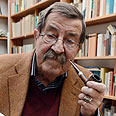

There are people who may write the greatest possible nonsense and nevertheless make it to the “culture section“ front pages of major newspapers. One of them is Günter Grass, German writer of fame and winner of the Nobel Prize in literature. He has written a text (titled “What has to be said“) about the conflict between Iran and Israel, a pamphlet beefed up by some technical tricks to make it look like a “poem.“ Here is the world according to Grass:
There is Iran. Her president has declared the destruction of the “Zionist entity“ (i.e. Israel) as his political goal. He has denied the Holocaust and has come very close to declare September 11 as a machination of the Israeli and American secret services. All that has left Grass silent, great moralist as he is. Ahmadinejad, well, for him he is only a “braggart who has brought the Iranian people under his yoke.“ By the way: that is quite an achievement for a mere braggart!
As far as the assumption is concerned, made not only by Israel, that Iran is striving for nuclear weapons, Grass has his own view. For him, all that is a “conjecture“ only, “formulated as an apprehension in order to win a cogent plausibility“.
There is Israel. According to Grass Israel is “asserting her authority to launch a first strike.“ He thereby asserts an Israeli intention to launch a nuclear attack. This assertion is not only absurd. It is monstrous. However, Grass needs this monster in order to build his central thesis: “Israel, the nuclear power, constitutes a danger for world peace.” Even more absurd, even more perfidious: Grass sees Israel as the “origin” of the danger. Confronted with such a total mental aberration, not only my gall-bladder is revolting.
And there is Germany. According to the unique logic of the author we could become “accomplices of a crime” by supplying Israel with a modern submarine. Well, everybody may be a deeply convinced pacifist. But nobody is allowed to leave reason aside. Who in the Near and Middle East is a threat to whom? And where was Günter Grass’ voice when the German Federal Government permitted the export of Leopard tanks into the Arab world?
And then he allows himself a strangely ironic escapade. According to Grass the delivery of this submarine “is being briskly declared as an act of restitution.” Well, even in his home town Lübeck the news should have arrived that the period of restitution has ended a long time ago.
Intolerable impudence
However, with this notion of restitution we arrive in the world of the dumb German “Stammtisch.” Grass explains why he has remained silent hitherto. He has remained silent because “my origin and descent, burdened by an everlasting stain” has forbidden him until now “to confront the country of Israel with the enunciated truth of these facts.” No, the opposite is true! Grass’ “truth” is an intolerable impudence, indeed!
The author presents another reason for his previous silence as well. Deeply convinced of his own importance he evokes the “collective coercion, which promises to punish those who try to step out of the line; the verdict ‘anti-Semitism’ is a familiar one.” Accepted: We should indeed be more cautious in using the term “anti-Semitism” in our public debates and in the media. However, there is no such “coercion” and since when has Günter Grass been afraid of criticism, even a polemic one?
Now the time for him has come to speak out and to present his truth, however. The reason? Well, Grass is “weary of the West’s hypocrisy.” How is it that the international endeavors to keep Iran away from nuclear weapons are nothing but a “hypocrisy of the West?”
If it needed further proof: Grass’ view of the world will remain forever simplistically leftist and anti-capitalistic. If we look for hypocrisy we can find it in the author’s text itself, when he pretends to be and to remain tied to the country of Israel. This is a kind of tie which seems to be deeply dispensable.
In the end we should remind ourselves that Grass has won the Nobel Prize for literature, not the one for peace. His lampoon should be seen in perspective and should not stir up much of a storm. The government’s spokesman, capable of fine irony, has mentioned the “freedom of the arts” principle. And what art is, that remains a field open to a very wide range of interpretation.
Manfred Lahnstein is a former cabinet chief and federal minister of finance in Helmut Schmidt’s government. Currently he is a member of University of Haifa’s board of governors and chairman of the Zeit-Stiftung foundation















